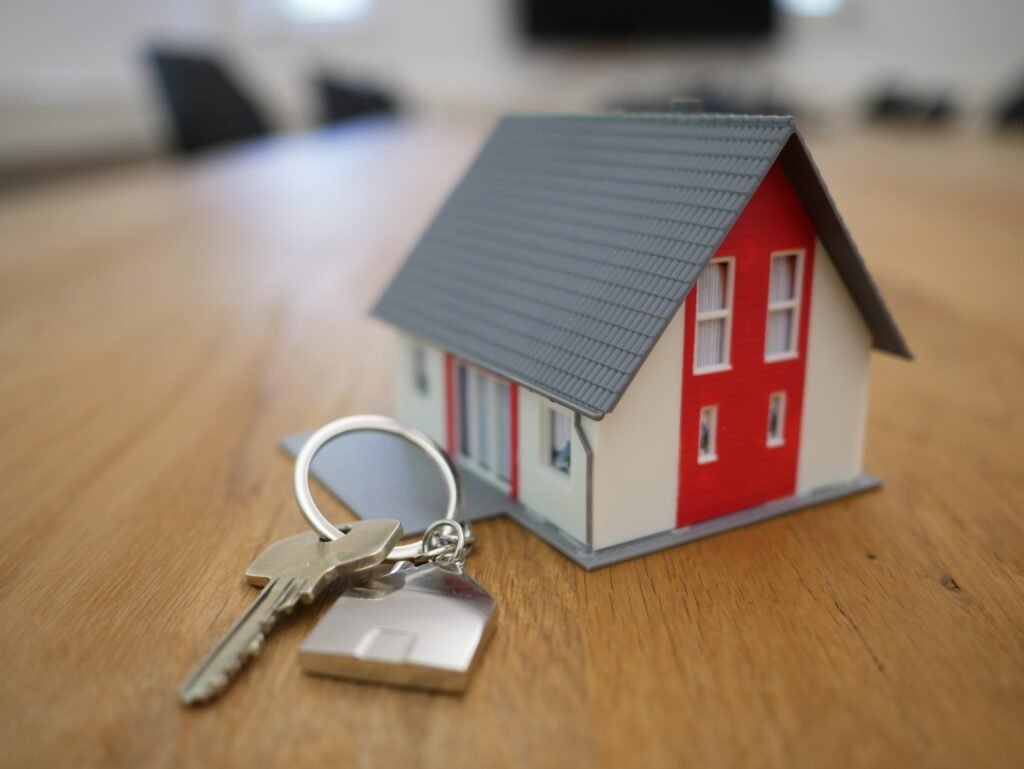Buying foreclosed properties can be an exciting and potentially lucrative venture. In this article, you will discover the step-by-step process of acquiring these properties, from finding listings to closing the deal. Whether you’re a seasoned investor or a first-time buyer, this guide will provide you with valuable insights and tips to help you navigate through the intricacies of purchasing foreclosed properties. So, get ready to embark on a rewarding journey into the world of real estate investing!

Understanding Foreclosed Properties
Definition of foreclosed properties
Foreclosed properties, also known as foreclosures, are properties that have been repossessed by a lender or bank due to the previous owner’s failure to make timely mortgage payments. When a homeowner defaults on their mortgage, the lender takes legal action to recover the outstanding debt by selling the property through a foreclosure process. These properties can include houses, apartments, condominiums, or commercial buildings.
Reasons for property foreclosure
There are various reasons why properties end up in foreclosure. Financial hardship, such as job loss, illness, or divorce, is one of the most common reasons. When homeowners are unable to meet their monthly mortgage payments, they fall into arrears and may ultimately face foreclosure if they cannot catch up on their payments.
Other reasons for property foreclosure can include economic downturns, market fluctuations, or a decrease in property values. Additionally, irresponsible financial management, such as taking on excessive debt or buying a property without adequate financial preparedness, can lead to foreclosure.
Types of foreclosed properties
Foreclosed properties can be classified into two main types: judicial foreclosure and non-judicial foreclosure.
In a judicial foreclosure, the foreclosure process is carried out through the court system. This typically involves filing a lawsuit against the homeowner and obtaining a court order to sell the property at auction.
Non-judicial foreclosures, on the other hand, do not require court involvement. The foreclosure process is conducted outside the court system, following a set of legal procedures outlined in the mortgage or deed of trust. This type of foreclosure is more commonly used in states where it is permitted.
Pros and Cons of Buying Foreclosed Properties
Financial benefits of buying foreclosed properties
One of the main advantages of buying foreclosed properties is the potential for financial savings. Foreclosed properties are often sold at discounted prices compared to their market value. This provides an opportunity for buyers to purchase properties at a lower cost and potentially build equity more quickly.
Another financial benefit is the possibility of purchasing a property in a desirable location that may have been otherwise unaffordable. Additionally, some foreclosed properties may come with attractive financing options, such as lower interest rates or reduced down payment requirements.
Potential risks and disadvantages
While there are financial benefits to buying foreclosed properties, it is important to consider the potential risks and disadvantages. Foreclosed properties are typically sold “as-is,” meaning they may require repairs or renovations before they can be occupied or resold. These additional costs can quickly add up and impact the overall financial feasibility of the investment.
Another risk is the potential for hidden liens or encumbrances on the property. Conducting a thorough title search and working with a professional real estate agent or legal advisor can help mitigate this risk.
Furthermore, purchasing a foreclosed property often involves a higher level of complexity and uncertainty compared to buying a traditionally listed property. The foreclosure process can sometimes be lengthy and unpredictable, requiring patience and flexibility on the part of the buyer.
Investing in foreclosed properties versus traditional properties
Investing in foreclosed properties offers a unique opportunity for individuals looking to enter the real estate market or expand their investment portfolio. Unlike traditional properties, foreclosed properties often come with discounted prices and the potential for higher returns on investment.
However, it is essential to thoroughly research and assess the specific risks and challenges associated with buying foreclosed properties. Traditional properties may offer greater stability and a more streamlined purchase process, but they may not provide the same financial benefits as foreclosed properties.

Identifying Suitable Foreclosed Properties
Different sources to find foreclosed properties
There are several sources to find foreclosed properties, each offering its own advantages and disadvantages. One common source is through public auction websites or foreclosure listings. These platforms provide a comprehensive list of foreclosed properties available for purchase, along with relevant information such as property details, auction dates, and bidding procedures.
Banks and lenders also offer foreclosed properties for sale through their real estate-owned (REO) departments. These properties have already gone through the foreclosure process and are now owned by the financial institution. Working directly with these lenders can provide access to a wide range of foreclosed properties.
Real estate agents specializing in foreclosures can be another valuable resource. They have access to industry-specific databases and can assist in identifying suitable properties based on specific criteria and budget.
Key factors to consider when selecting a property
When choosing a foreclosed property, it is crucial to consider various factors to ensure a wise investment decision. Location is a fundamental aspect to evaluate, as properties in desirable areas tend to hold their value better and have greater potential for appreciation.
Additionally, assessing the property’s condition is essential. Conducting a thorough inspection or obtaining a professional property assessment can help identify any potential issues or necessary repairs. This information is critical in determining the true value and feasibility of the investment.
Furthermore, analyzing the potential rental income or resale value of the property is crucial, especially if you are considering it as an investment. Understanding the local market and the demand for rental properties or buyers in the area will help inform your decision-making.
Role of location in property selection
The old adage “location, location, location” is particularly relevant when selecting a foreclosed property. The location of a property plays a significant role not only in its value but also in its potential for appreciation or rental income.
Properties in prime locations, such as proximity to schools, public transportation, shopping centers, and employment hubs, tend to attract more renters or buyers. These areas often experience higher demand, leading to potentially higher resale values or rental rates.
While it may be tempting to focus solely on the attractive price of a foreclosed property, it is essential to consider the location’s long-term viability and growth potential. Investing in a property in a desirable location increases the likelihood of a successful real estate investment.
Hiring a Real Estate Agent and Legal Advisor
Why you need a real estate agent
Engaging the services of a qualified real estate agent can greatly simplify the process of buying a foreclosed property. With their expertise and knowledge of the market, real estate agents can help you navigate the complexities and provide valuable insights.
A real estate agent specializing in foreclosures can save you time and effort by identifying suitable properties based on your specific criteria. They have access to databases and resources that may not be readily available to the general public. Additionally, agents can assist in negotiating with lenders or sellers, helping you secure the best possible deal.
Benefits of having a legal advisor
Working with a legal advisor is crucial when buying a foreclosed property, as it involves complex legal processes and potential risks. A legal advisor can review any legal documents associated with the property, including the foreclosure paperwork, title deeds, and contracts. They can ensure that you fully understand all the terms and conditions and advise you on the potential legal implications of the investment.
Having a legal advisor can also protect your interests in the event of any disputes or issues that may arise during the purchasing process. They can provide guidance on your rights and responsibilities as a buyer and ensure that all necessary legal obligations are met.
Finding professional help
When hiring a real estate agent and legal advisor, it is crucial to find professionals with experience and expertise in dealing with foreclosed properties. Seek recommendations from friends, family, or colleagues who have successfully purchased foreclosed properties in the past.
It is also important to interview potential candidates and ask relevant questions about their knowledge of the foreclosure market, their track record, and their fees. Building a strong and trusted team of professionals will greatly increase your chances of a successful purchase.

Understanding the Local Housing Market
Importance of understanding the housing market
To make informed decisions when buying a foreclosed property, it is essential to have a comprehensive understanding of the local housing market. The housing market encompasses factors such as property values, rental rates, supply and demand, and economic conditions that influence the overall health and stability of the real estate market.
Understanding the housing market allows you to identify potential investment opportunities, assess the potential risks and returns, and make strategic decisions based on market conditions. It also helps you gauge the competitiveness of the market and determine how quickly you can expect to sell or rent out the property.
Effects of the housing market on foreclosed property prices
The housing market greatly influences the prices of foreclosed properties. During times of economic downturn or high foreclosure rates, the market may be flooded with foreclosed properties, which can drive prices down. Conversely, in a strong market with high demand and limited supply, foreclosed properties may sell at higher prices due to increased competition.
Monitoring market trends and understanding the factors that affect property prices in your target area are crucial in determining the timing and potential profitability of purchasing a foreclosed property.
Useful resources for housing market analysis
There are various resources available to help you analyze the local housing market. Online real estate portals, such as Zillow or Rightmove, provide data on property values, recent sales, and rental rates in specific areas. They also offer market reports and forecasts that can help you make informed decisions.
Local real estate associations often publish market reports providing insights and data on the local housing market. These reports may include information on trends, inventory levels, and local economic conditions. Utilizing these resources can provide valuable information to guide your investment strategy.
Financial Planning and Securing Funding
Creating a budget for buying a foreclosed property
Before embarking on the journey of buying a foreclosed property, it is crucial to create a comprehensive budget. This budget should not only include the purchase price but also account for potential expenses such as repairs, renovations, property taxes, insurance, and ongoing maintenance costs.
Considering these expenses upfront will help you determine the maximum purchase price you can afford and ensure that the investment remains financially viable in the long run. It is advisable to consult with a financial advisor or real estate professional to accurately estimate these costs.
Options for funding
There are several options for funding the purchase of a foreclosed property. Traditional mortgage loans, provided by banks or lenders, are often available for these properties. It is important to shop around for the best interest rates and terms to ensure the financing aligns with your financial goals.
Private lenders or hard money lenders can also offer funding for foreclosed properties, particularly for individuals who may not qualify for traditional financing due to credit or income limitations. However, private financing often comes with higher interest rates and shorter repayment terms, so it is important to carefully assess the terms and weigh them against the potential benefits.
Navigating funding and approval processes
Securing funding for a foreclosed property can be more complex than traditional property purchases. It is crucial to gather all the necessary documentation, such as income statements, credit reports, and property information, to present to potential lenders.
Working with a mortgage broker or loan officer who specializes in foreclosed properties can greatly simplify the process. They can guide you through the required paperwork, help you secure pre-approval, and ensure that you are well-positioned to secure the necessary funding.
Making an Offer and Negotiating Price
How to make an offer on a foreclosed property
Once you have identified a suitable foreclosed property, it is time to make an offer. Depending on the sales method (auction or traditional sale), the process may vary slightly.
If the property is listed for sale through a real estate agent, you can submit a formal offer using a purchase agreement. This document outlines the offer price, contingencies, and other terms and conditions. It is essential to carefully review and understand the purchase agreement before submitting your offer.
In the case of an auction, you will typically need to register as a bidder and follow the auction rules and procedures. Bidding may be competitive, so it is important to set a budget in advance and stick to it.
Tips for negotiating the property price
Negotiating the price of a foreclosed property requires strategy and careful consideration. Start by thoroughly researching the property’s market value and comparing it to similar properties in the area. This will provide a benchmark for determining an appropriate offer price.
Consider any necessary repairs or renovations and factor in those costs when determining your offer. It is possible to negotiate a lower price if you can demonstrate that the property requires substantial investment to make it habitable or marketable.
Additionally, be prepared to be flexible and patient during the negotiation process. Foreclosed properties may involve multiple interested parties and negotiations can take time. Stay informed, stay focused, and be prepared to walk away if the terms or price do not align with your investment goals.
Common mistakes to avoid when negotiating
When negotiating the price of a foreclosed property, there are several common mistakes to avoid. Firstly, avoid getting emotionally attached to a particular property. Emotions can cloud judgment and lead to overpaying or compromising on important terms.
Secondly, avoid making a lowball offer that is unreasonably below the market value. This can alienate the seller or lender and make them less inclined to negotiate with you. Instead, base your offer on solid research and a realistic assessment of the property’s value.
Lastly, beware of engaging in bidding wars or exceeding your predetermined budget. It is important to stick to your financial plan and investment goals to ensure a successful and financially viable purchase.
Property Inspection and Assessment
Role of property inspection and assessment
Conducting a thorough property inspection and assessment is a critical step in the purchasing process of a foreclosed property. While foreclosed properties are typically sold “as-is,” a comprehensive inspection can uncover any potential issues or hidden defects that may affect the property’s value and feasibility.
An assessment will help identify any necessary repairs or renovations and provide an estimate of the associated costs. This information is invaluable in determining the true value of the property and gauging its suitability for your investment goals.
Finding a reliable property assessor
To ensure a reliable property assessment, it is important to hire a qualified and experienced property assessor. Seek recommendations from trusted sources, such as your real estate agent or other professionals in the industry.
Verify that the assessor holds the necessary certifications or qualifications and has a track record of conducting comprehensive inspections. It is advisable to accompany the assessor during the inspection process to ask questions and gain a deeper understanding of the property’s condition.
Understanding property inspection findings
Upon completion of the inspection, the property assessor will provide a detailed report outlining their findings. This report may include information on the property’s structural integrity, electrical and plumbing systems, roofing, and any other areas of concern.
Carefully review the inspection report and discuss any significant findings with your real estate agent or legal advisor. Depending on the severity of the issues identified, you may need to reassess the property’s value and determine if you are willing to proceed with the purchase.
Finalising the Purchase
Steps to take after the seller accepts offer
Once the seller or lender accepts your offer, it is important to take the necessary steps to finalize the purchase. Work with your real estate agent or legal advisor to ensure that all contractual obligations are met within the specified timeline.
Firstly, you will need to arrange for a property appraisal to verify the value of the property for the lender. This is typically a requirement for obtaining a mortgage loan.
Secondly, conduct a title search to ensure the property has a clear title and there are no outstanding liens or encumbrances.
Lastly, review all necessary legal documents, such as the purchase agreement, loan documentation, and any additional contracts or disclosures required by law. Seek guidance from your legal advisor to ensure a smooth and legally compliant transaction.
Completing legal obligations
Finalizing the purchase of a foreclosed property involves fulfilling several legal obligations. These obligations may vary depending on the jurisdiction and sales method, so it is important to familiarize yourself with the applicable laws and regulations.
Typically, you will need to prepare and sign various legal documents, including the deed, transfer of ownership documents, and mortgage or loan agreements. It is essential to review these documents carefully and understand the legal implications before signing.
Working with a legal advisor specializing in real estate transactions can provide peace of mind and ensure that all legal obligations are met.
Closing the deal and transferring ownership
The final step in purchasing a foreclosed property is the closing or settlement process. During this stage, all necessary documents are signed, and ownership of the property is officially transferred to the buyer.
In some cases, the closing may occur in person at a designated location, such as a title company or attorney’s office. Alternatively, it can be conducted remotely through electronic signatures and online platforms.
At closing, you will be required to provide the necessary funds to cover the purchase price, closing costs, and any additional fees or taxes. It is essential to have all the required funds available and to obtain any necessary cashier’s checks or wire transfers in advance.
Once all documents have been signed and funds exchanged, ownership of the foreclosed property is transferred to you, and you officially become the new owner.
Potential Post-Purchase Challenges
Possible repairs and renovations
One of the potential challenges of buying a foreclosed property is the need for repairs and renovations. Many foreclosed properties are sold in “as-is” condition, meaning they may require significant work to make them habitable or marketable.
Before proceeding with the purchase, ensure that you have accurately assessed the costs of any necessary repairs or renovations. Create a realistic budget and timeline for completing these improvements, taking into account potential unforeseen challenges that may arise.
Handling evictions or tenants
In some cases, a foreclosed property may have tenants or occupants who are not party to the sale. Handling evictions or communicating with tenants can present challenges, particularly if there are legal or lease agreements in place.
Before purchasing a foreclosed property with tenants, ensure you understand the local landlord-tenant laws and regulations. Familiarize yourself with the legal rights and responsibilities of both parties and seek legal advice if necessary.
Reselling or renting out the property
After purchasing a foreclosed property, you may have the option to either resell it or rent it out. Determining the most suitable strategy will depend on various factors, such as the current market conditions, demand for rental properties, and your long-term investment goals.
Reselling a foreclosed property requires careful consideration of the local housing market and pricing strategy. Working with a knowledgeable real estate agent can help ensure that you position the property effectively to attract potential buyers and maximize your return on investment.
Renting out a foreclosed property requires understanding the local rental market, setting appropriate rental rates, and finding responsible tenants. Conduct thorough tenant screening and consider working with a property management company to handle the day-to-day operations and maintenance.
In either case, developing a comprehensive marketing plan and seeking professional advice can increase your chances of a successful resale or rental outcome.
In summary, understanding the process of buying foreclosed properties is essential for anyone considering this type of investment. By comprehending the definition and types of foreclosed properties, one can begin to weigh the pros and cons of this investment opportunity. Identifying suitable foreclosed properties involves utilizing different sources, considering key factors, and recognizing the role of location. Hiring a real estate agent and legal advisor is crucial for navigating the complexities of the process and ensuring a successful transaction. Understanding the local housing market provides valuable insights for pricing and potential returns. Proper financial planning and securing funding are instrumental in making the purchase affordable and feasible. Making an offer and negotiating the price require strategic thinking and knowledge of the property’s value. Property inspection and assessment help uncover any potential issues or necessary repairs. Finalizing the purchase involves fulfilling legal obligations and transferring ownership. Post-purchase challenges may include repairs, handling evictions or tenants, and deciding whether to resell or rent out the property. With careful consideration and the right guidance, buying a foreclosed property can be a rewarding investment opportunity.
